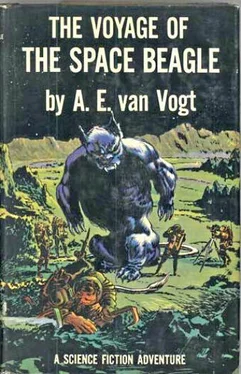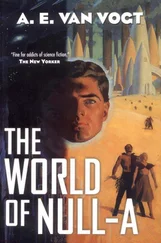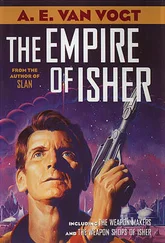McCann was silent. Grosvenor went on. “I think you’ve got a picture in your mind of a dictator — myself — taking over a democracy by force. That picture is false, because a ship on a cruise can be run only by quasi-democratic methods. And the greatest difference of all is that at the end of the voyage I can be brought to account.”
McCann sighed. “I suppose you’re right,” he said. He glanced at the plate. Grosvenor followed his gaze, and saw that the space-suited men were trying to propel themselves forward by pushing against the wall. Their hands tended to go right into the walls, but there was some resistance. They were making slow progress. McCann was speaking again. “What are you going to do now?”
“I intend to put them to sleep — like this.” He touched the activating switch.
The bell sound seemed no louder than before. Yet in the corridor the men slumped over.
Grosvenor got up. “That will repeat every ten minutes, and I’ve got resonators spread all through the ship to pick up the vibrations and echo them. Come along.”
“Where are we going?”
“I want to install a circuit breaker in the main electric-switch system of the ship.”
He secured the breaker from the film room, and a moment later was leading the way into the corridor.
Everywhere they went, men lay sleeping. At first McCann marvelled out loud. Then he grew silent and looked troubled. He said finally, “It’s hard to believe that human beings are basically so helpless.”
Grosvenor shook his head. “It’s worse than you think.”
They were in the engine room now, and he crawled on to a lower tier of the electric switchboard. It required less than ten minutes to fit in his circuit breaker. He came down silently, nor did he subsequently explain what he had done or what he intended to do.
“Don’t mention that,” he said to McCann. “If they find out about it, I’ll just have to come down and put in another one.”
“You’re going to wake them now?”
“Yes. As soon as I get back to my rooms. But first I’d like you to help me cart Von Grossen and the others to their bedrooms. I want to make him disgusted with himself.”
“You think they’ll give in?”
“No.”
His estimate was right. And so, at 1000 hours the following day, he pressed home a switch that rechannelled the main electric current through the circuit breaker he had installed.
All over the ship, the constantly burning lights flickered ever so slightly in a Nexial version of the Riim hypnotic pattern. Instantly, without knowing it, every man aboard was deeply hypnotized.
Grosvenor began to play on his emotion-educing machine. He concentrated on thoughts of courage and sacrifice, duty to the race in the face of danger. He even evolved a complex emotional pattern that would stimulate the feeling that time was passing at double, even treble, what had been normal before.
The basis laid, he activated the “General Call” of the ship’s communicator, and gave exact commands. The main instructions stated, he then told the men that each and every one would thereafter respond instantly to a cue word without ever knowing what the cue word was, or remembering it after it was given.
Then he gave them amnesia for the entire hypnotic experience.
He went down to the engine room and removed the circuit breaker.
He returned to his own room, wakened everybody, and called Kent. He said, “I withdraw my ultimatum. I’m ready to give myself up. I’ve suddenly realized that I cannot bring myself to go against the wishes of the other members of the ship. I would like another meeting, at which I will appear in person. Naturally, I intend to urge once more that we wage all-out warfare against the alien intelligence of this galaxy.”
He was not surprised when the ship’s executive, strangely unanimous in their change of heart, agreed that after consideration they could see that the evidence was clear, and that the danger was compellingly urgent.
Acting Director Kent was instructed to pursue the enemy relentlessly, and without regard for the comfort of the members of the ship.
Grosvenor, who had not interfered with the over-all personality of any individual, observed with grim amusement the reluctance with which Kent himself acknowledged that the action should be taken.
The great battle between man and alien was about to begin.
The Anabis existed in an immense, suffused, formless state, spread through all the space of the second galaxy. It writhed a little, feebly, in a billion portions of its body, shrinking with automatic adjustment away from the destroying heat and radiation of two hundred billion blazing suns. But it pressed tightly down against the myriad planets, and strained with a feverish, insatiable hunger around the quadrillion tingling points in which were dying the creatures that gave it life.
It was not enough. The dread knowledge of an imminent starvation seeped to the farthest reaches of its body. Through all the countless, tenuous cells of its structure came messages from near and far, proclaiming that there was not enough food. For long now, all the cells had had to do with less.
Slowly, the Anabis had come to realize that it was either too big — or too small. It had made a fatal mistake in growing with such abandon during its early days. In those years, the future had seemed limitless. The galactic space, where its form could wax ever huger had appeared of endless extent. It had expanded with all the vaunting, joyous excitement of a lowborn organism grown conscious of stupendous destiny.
It was lowborn. In the dim beginning it had been only gas oozing from a mist-covered swamp. It was an odourless, tasteless gas, yet somehow, someway, a dynamic combination was struck. And there was life.
At first it was nothing but a puff of invisible mist. Ardently, it darted over the muggy, muddy waters that had spawned it, twisting, diving, pursuing incessantly and with a gathering alertness, a gathered need, striving to be present while something — anything — was being killed.
For the death of others was its life.
Not for it was the knowledge that the process by which it survived was one of the most intricate that had ever been produced by a natural life chemistry. Its interest was in pleasure and exhilaration, not in information. What a joy it felt when it was able to swoop over two insects, as they buzzed in a furious death struggle, envelop them, and wait, trembling in every gassy atom, for the life force of the defeated to spray with tingling effect against its own insubstantial elements.
There was a timeless period then, when its life was only that aimless search for food. And its world was a narrow swamp, a grey, nubiferous environment, where it lived its contented, active, idyllic, almost mindless existence. But even in that area of suffused sunlight it grew bigger imperceptibly. It needed more food, more than any haphazard search for dying insects could bring it.
And so it developed cunning, special little bits of knowledge that fitted the dank swamp. It learned which were the insects that preyed, and which were the prey. It learned the hunting hours of every species, and where the tiny, non-flying monsters lay in wait — the flying ones were harder to keep track of. Though — as the Anabis discovered — they, also, had their eating habits. It learned to use its vaporous shape like a breeze to sweep unsuspecting victims to their fate.
Its food supply became adequate, then more than adequate. It grew, and once more it hungered. Of necessity, it became aware that there was life beyond the swamp. And, one day, when it ventured farther than ever before, it came upon two gigantic armoured beasts at the bloody climax of a death struggle. The sustained thrill that came as the defeated monster’s life force streamed through its vitals, the sheer quantity of energy it received, provided ecstasy greater than it had experienced during all its previous lifetime. In a few hours while the victor devoured the writhing vanquished, the Anabis grew by ten thousand times ten thousand.
Читать дальше











